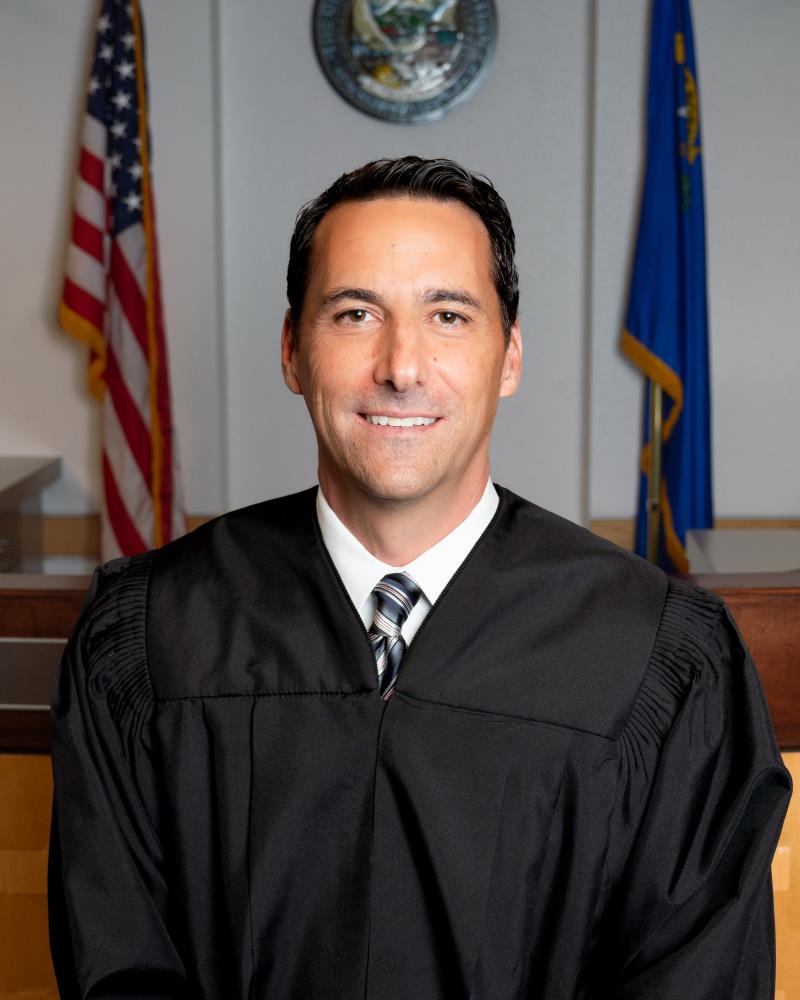Department C

Gregory G. Gordon
Office – (702) 455-5992
Fax – (702) 380-2839
Law Clerk – (702) 455-5089
Email – deptclc@clarkcountycourts.us
Location – FAMILY Courtroom 08
Family Court House
601 North Pecos RD, Las Vegas, NV. 89155
Judge Gregory Gordon was born and raised in Las Vegas. Proudly educated in the Clark County School District, Judge Gordon graduated from Valley High School in 1987. He attended Occidental College in Los Angeles, California, graduating cum laude with a bachelor’s degree in economics in 1991. After college, Judge Gordon attended Pepperdine University School of Law in Malibu, California.
While in law school, Judge Gordon was a member of the Dean’s Honor Roll and served on the editorial board of the Pepperdine Law Review. He graduated magna cum laude and received his juris doctor from Pepperdine in 1994 ranked #8 in his graduating class.
After law school, Judge Gordon worked as an attorney at the prestigious Las Vegas law firm of Jolley, Urga, Wirth & Woodbury, rising to the level of partner in the firm. In July of 2003, Judge Gordon left the firm to open his own law practice.
Before Governor Joe Lombardo appointed Judge Gordon to serve as a District Court Judge in the Eighth Judicial District Court, Family Division in 2023, Judge Gordon practiced in the area of family law in Clark County, Nevada for 29 years.
Judge Gordon has written numerous articles pertaining to family law, including: Property and Contractual Rights of Nonmarital Cohabitants: Putting Western States Construction, Inc. v. Michoff into Proper Perspective, The Communique, July, 1994; Representing Children, Nevada Lawyer, October, 1995; and Valuation of Business Interests in Divorce: The Significance of the Buy-Sell Agreement, Nevada Family Law Report, March, 2000.
Judge Gordon also authored the first print edition of “Nevada Child Custody and Visitation” which appears in the Nevada Family Law Practice Manual, a resource used by many Nevada attorneys and judges.
Judge Gordon is a member of the Nevada State Bar, Clark County Bar Association, and American Bar Association. He is a former editor of the Nevada Lawyer Magazine and the Nevada Family Law Reporter.
Courtroom Protocol
No weapons are allowed. There is no eating, drinking, smoking or chewing gum in any courtroom.
Proper courtroom attire is required. No shorts or tank tops are allowed in the courtroom, shoes are required. T-shirts, which show offensive slogans or pictures, are not allowed. Hats should be removed before entering the courtroom.
While in the courtroom, sit quietly when court is in session. Do not talk or whisper. The court proceedings are being recorded by a court recorder and noise can interfere with the preparation of this important record.
All beepers, cellular telephones, and electronic devices must be turned off before entering the courtroom. Avoid reading newspapers, or books in the courtrooms, particularly if your use of such material may be a distraction to others.
Attorneys are expected to maintain the highest ethical standards at all times, and to strictly adhere to the opportunities, requirements, limitations, and deadlines set by the judge. All counsel are to be punctual for all conferences, hearings and trials. They are to be civil to one another as well as to all parties, witnesses, and court personnel – whether in front of a jury or the court.
Documents
Department C Zoom Information (Effective February 5th 2024)
Chamber Calendar
-
- Adoptions in Chambers – No
Telephonic and Video Appearances
-
- All Non-Trial and Non-Evidentiary proceedings will be heard by Blue Jeans video or telephone appearances pursuant to AO 21-04 until relieved by a subsequent AO.
- All Trial and Evidentiary proceedings will be heard pursuant to AO 21-04, statutes, and case law with a preference for Blue Jeans video (but not telephone) appearances.
Unopposed Motions
-
- Department C grants unopposed motions in advance of the hearing date: Sometimes
- Department C permits Zoom Orders: Sometimes; unopposed motions to withdraw can be zoomed.
Joint Preliminary Injunctions
-
- .Department C considers a JPI to be an enforceable Court Order.
Prove-up Hearings
-
- Does Department C require a prove-up hearing for:
- Name changes for minor children? Sometimes at request of Court
- Final custody orders? Sometimes at request of Court
- Summary Divorce? Sometimes at request of Court
- Default orders? Sometimes at request of Court
Submission of Orders
-
- Does Department C require prevailing counsel to submit a draft order to opposing counsel to review and return an Order? Yes
- Does Department C impose a period of time for opposing counsel to review and return an Order? Yes
Contested Orders
-
- When counsel cannot agree on the language of an Order, Department C requires compliance with EDCR 5.522 drafting counsel may directly submit the proposed order to the Court, accompanied by an explanation of the attempts made to obtain countersignature, with a copy to opposing counsel, and opposing counsel may submit an alternate order, accompanied by an explanation of the disagreement and distinction between the two proposed order, with a copy to opposing counsel. The proposed order(s) will be reviewed by the Law Clerk with the videotape record.
Electronic Signatures
-
- Department C accepts electronic signatures.
Telephonic Conferences
-
- Is Department C available for telephonic conferences with counsel? Yes
Stacking Trails
-
- Does Department C stack trials? No

